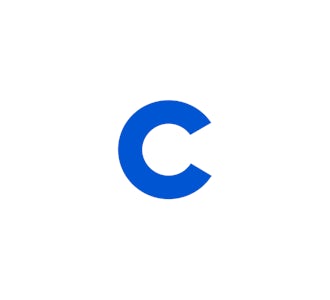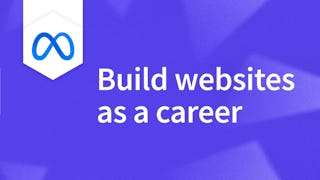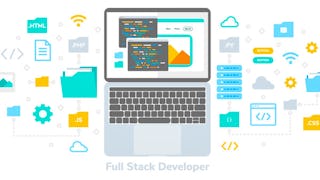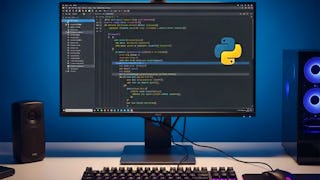![[Featured Image] Two cybersecurity experts working in a data center discuss various types of firewalls.](https://images.ctfassets.net/wp1lcwdav1p1/2wkNsVOZNWsgmayn9LgGMG/60a23ba481d6a3f20492a472acb103c6/GettyImages-1340944503.jpg?w=330&h=216&q=60&fit=fill&f=faces&fm=jpg&fl=progressive)
Types of Firewalls for Cybersecurity
This article explores the significance of firewalls, the pros and cons of different versions, and how to use this cybersecurity tool.
February 2, 2024
Article
Behind great technology are great developers and designers. Learn how to build your skills for a career in website, app, or software development.uzbek

Top courses to explore computer science and engineering

Skills you'll gain: User Experience Design, User Interface and User Experience (UI/UX) Design, User Experience, Design Research, Linux Commands, User Centered Design, Debugging, User Interface (UI), Software Versioning, Software Visualization, Web Content Accessibility Guidelines, Pseudocode, JavaScript Frameworks, Javascript, Web Applications, Semantic Web, Cascading Style Sheets (CSS), Unit Testing, Application Programming Interface (API), Application Development
Build toward a degree
Beginner · Professional Certificate · 3 - 6 Months

Skills you'll gain: Prompt Engineering, Software Development Life Cycle, Cloud-Native Computing, Istio, Software Architecture, Kubernetes, CI/CD, Cloud Computing Architecture, Application Deployment, React Redux, Node.JS, Responsive Web Design, Restful API, Django (Web Framework), Git (Version Control System), Server Side, Hypertext Markup Language (HTML), Cloud Computing, Data Import/Export, Engineering Software
Build toward a degree
Beginner · Professional Certificate · 3 - 6 Months

Skills you'll gain: Cryptography, Object Oriented Programming (OOP), Encryption, Application Development, Data Structures, Software Development, Automation, Machine Learning Algorithms, Data Processing, Public Key Cryptography Standards (PKCS), Databases, Python Programming, Natural Language Processing, Algorithms, Key Management, SQL, Machine Learning Methods, Software Installation, Programming Principles, Data Validation
Beginner · Specialization · 3 - 6 Months
Many exciting career paths are available for anyone interested in computer science and engineering, from artificial intelligence and cryptography to software engineering and web development. A wide variety of opportunities are available, so finding the right place to start can be challenging. Coursera offers expert resources to support your goal, whether you're just starting or are ready to take the next step.
Interested in computer science? Explore entry-level computer science jobs and develop in-demand computer science skills.
Interested in software development? Learn more about the difference between a software developer and a software engineer, or explore a career in web and app development.
Interested in design? Explore design and product topics, including UI vs. UX Design, 3D design, and Graphic design.
Ready to start learning? Explore Coursera's catalog of computer fundamentals, computer programming, or computer science courses for beginners to experts.
Computers are an essential part of our internet-enabled lives today, but what does it mean to study computer science? Computer science, often referred to as CS, is a broad field encompassing the study of computer systems, computational thinking and theory, and the design of software programs that harness the power of this hardware to process data.
Those studying computer science may end up taking a similarly broad range of career pathways. Many CS majors focus on building skills in software programming, coding, and web development, all of which are highly sought after by a wide variety of companies. However, others may focus on more specialized topics such as algorithmic problem solving, machine learning and artificial intelligence, cybersecurity, and even robotics!
Studying computer science means learning some complex topics like algorithms and coding. With the right motivation, patience, and an interest in computers, you can find success in this challenging field.
If you’re organized, pay attention to detail, and enjoy problem solving, computer science could be a good fit. Enhance your understanding of technology and learn skills to empower you to work in the computer careers of the future.
The time, effort, and monetary investment of earning a degree potentially opens up well-paying job opportunities in many in-demand fields. Check the job requirements of some positions you’d like to apply to in the future to see if a computer science degree aligns with your career goals.